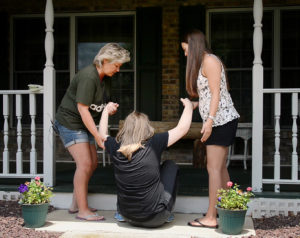By Susan Jennings and Ashley May, Daily Record/Sunday News Suzanne Keim and her daughter, Sarah…

Life on the waiting list: The struggle to receive intellectual disability services in Pennsylvania
By Kate Giammarise / Pittsburgh Post-Gazett (http://goo.gl/sDCx9I)

Abbey Etling lifts the sippy cup to her lips and drinks from it.
It’s a small gesture, but one that is laden with meaning for her mother, Sandy Etling.
Being able to lift a cup, drink from it, and set it down without dropping it or spilling it — it’s something that most adults do without a second thought dozens of times every day.
But for Abbey, 22, who has an intellectual disability and autism, it is a skill that took years to learn and master. She still struggles with putting the cup down.
On a recent afternoon, Mrs. Etling is watching old home movies from when Abbey, then 4, first began to receive the 50 hours a week of intensive therapy that helped her learn to walk, be able to interact with others and to do more than just drink from a bottle.
“See when we started teaching her to put a cup down? And we’re still teaching her…It’s been 18 years of trying to get her to put her cup down,” Mrs. Etling said.

Making a challenging situation harder, Abbey is one of nearly 14,000 people in Pennsylvania with intellectual disabilities on a waiting list to receive services from the state.
She and the others are waiting for Medicaid funding, technically called a “Medical Assistance home and community-based waiver.”
It is essentially the state’s Medicaid program, using a combination of state and federal dollars, paying for care in people’s homes or a small-group setting, rather than the isolated large institutions that were previously the state’s primary home for those with intellectual disabilities. It costs about $47,000 on average to care for a person in their home, and about $145,000 to care for an individual in a community-based program.
The waiting list is actually three separate lists: the planning list, for those who will need services in several years; the critical list, for those who will need services in more than six months but less than two years; and the emergency list for people who will need services within six months — or in some cases, immediately.
Abbey is one of nearly 5,000 people on the emergency list.
As of now, the only way a spot on the waiting list opens up is if someone moves out of state, or dies.
It is this indefinite, prolonged waiting that is the hardest on Mrs. Etling. Abbey received intensive services and supports until she turned 21, and since losing them last year, she has sharply regressed in her abilities. She essentially needs one-on-one care all the time, can rarely walk outside any longer and is no longer toilet trained.
The waiting list is actually three separate lists: the planning list, for those who will need services in several years; the critical list, for those who will need services in more than six months but less than two years; and the emergency list for people who will need services within six months — or in some cases, immediately.
Abbey is one of nearly 5,000 people on the emergency list.
As of now, the only way a spot on the waiting list opens up is if someone moves out of state, or dies.
It is this indefinite, prolonged waiting that is the hardest on Mrs. Etling. Abbey received intensive services and supports until she turned 21, and since losing them last year, she has sharply regressed in her abilities. She essentially needs one-on-one care all the time, can rarely walk outside any longer and is no longer toilet trained.

“Before, we used to walk her up and down the road. And we used to play kickball in the front yard,” Mrs. Etling recalls.
Her mother feeds Abbey by hand, one bite at a time, the way you would feed a toddler. Lifting Abbey into the bathtub and bathing her is a struggle that Mrs. Etling cannot handle without assistance.
“All the skills that she learned so well, she has lost,” Mrs. Etling says, wiping away tears.
Mrs. Etling had to quit her job as a preschool aide last year to care for her daughter full-time. Another of Mrs. Etling’s children had to leave college and attend community college closer to home in Westmoreland County to assist her mother in caring for Abbey.
“What’s hard is you see her regressing, and there’s nothing I can do except be on this waiting list. And you know, I call everybody I can call, but it doesn’t do anything, because they have to have the money from the state.”
Supports until age 21, then a ‘cliff’
In Squirrel Hill, Chitra Sharathchandra is nervously awaiting November, when her son Tejus will turn 21, and be cut off from many of the supports and services he now has daily for his intellectual disability and his autism. He will lose the behavior and occupational therapy he gets now.
Services are lost at age 21 because until that age, the care these children and young people receive is considered a federal entitlement -—that is, Medicaid has to pay for it. But after age 21, that entitlement ends.
Tejus too, is on the emergency waiting list, and his mother is concerned he will lose the services that help him learn daily tasks such as shaving, pouring cereal into a bowl or folding clothes. Tejus also has an anxiety disorder that causes problems when he hears certain loud noises — if a plate is set down hard, for instance, he might slam a plate down himself and shatter it. He gets therapy now to help him better cope with this, a service his mother is concerned about losing.

Getting funding from the waiting list could help Tejus have an aide, spend more time in the community, and ideally, allow him to have some type of vocational training, or one day, employment. While Tejus must work over and over again to learn daily activities, he does have skills that could be used in a workplace. Mrs. Sharathchandra, who has a background in computer science, has worked to show Tejus how to use spreadsheets -— doing data entry and calculating numbers according to a formula, tasks Tejas can do seemingly endlessly.
On a recent afternoon, Tejus and his mother are going through some of their usual after-school activities -— folding laundry, practicing Excel, reading together, and spending time playing the piano and practicing singing Indian Carnatic music.
They are reading a new book together for the first time, “The Conversation Train,” a book designed to teach conversation skills to children with autism.
Mrs. Sharathchandra found the book online. She spends hours online every week, researching what tools and techniques she can use to better assist her son and help him learn.
Without the waiver funding, Mrs. Sharathchandra worries about what will happen to her son as she and her husband get older.
“My worry is, as we get older, we can maybe take care of him for another 20 years,” she said. “My biggest fear is that if we both are gone, what is going to happen to him? We are hoping that we can set him up, while we are healthy, that we set him up in a situation where we are satisfied. Just like we would for our typical children. Send them off to college, hope they get that first job, and then think, ‘Hey, he’ll be OK now.’ I want to see that ‘He’ll be OK now’ day for Tejas. Getting that waiver funding would be that day for us.”

Despite her fears and her struggles, Mrs. Sharathchandra said she doesn’t want people to feel sorry for her.
“We’re not looking for pity. We’re looking for what is fairly due to my kid.”
Like every mother — where others might see difficulty — she sees potential, and dreams of what is possible for her child.
“He’s going to have a great life — provided the services are provided for him…These kids can have great lives, as long as they have the right supports. Tejus I know can be very successful, if he has the funding, if he has the right professional supports. We’ve come a long way with him.”
The politics
In recent years, there have been between 400 and 500 new consolidated waiver slots added in every budget; Gov. Tom Wolf’s proposal for the fiscal year that begins July 1 proposes to add only 250 new consolidated waiver spots.
When waiting list campaign started in 1999, there were more than 30,000 people on the waiting list. Years of relentless advocacy by people like Nancy Murray, president of The Arc of Greater Pittsburgh at ACHIEVA, who has worked for many years with The PA Waiting List Campaign to push for additional funding, and countless one-on-one meetings with legislators have helped push that number down.
“This is not a partisan issue,” Ms. Murray said.
But it does take money, and the pressures on the commonwealth’s budget are tremendous. The state is facing a sizable budget deficit legislators and the governor must figure out how to close by the end of the fiscal year — June 30. While no one in the House or Senate has singled out the waiver program, a number of legislators, including many in the Republican leadership, have argued that the state must hold the line on spending.

The consolidated waiver is only one program in more than $30 billion state general fund budget, competing against thousands of other programs for its share of state dollars.
“I just think this is the most vulnerable population,” Mrs. Etling said. “They can’t speak for it themselves….They can’t show the desperate need that they have for services. So I think they get overlooked….And while that’s happening, they are losing quality of life for themselves and their families. It’s heartbreaking to watch your child regress when you know they have so much potential.”
Many state representatives and senators don’t realize what these services are and what they mean to families -— and how life-altering it can be when they are reduced or cut off, said Rep. Dan Miller, D-Mt. Lebanon, co-chair of the legislative Autism and Intellectual Disabilities Caucus. Mr. Miller has been pushing for a five or 10-year formal plan to eliminate the waiting list.
“This should be a moral commitment for us to assist these people, and the families that are struggling to keep everything in balance,” Mr. Miller said.
It is also an issue that, from Mr. Miller’s perspective, crosses party lines.
“The families that are affected by this, don’t give a damn whether it is a Democrat or a Republican that helps them,” he said.
‘Sleepless nights’
After filling out waiting list paperwork with a supports coordinator earlier this month, Mrs. Sharathchandra is reflecting on waiting to find out if Tejus will have the services he needs a year from now.
“Sleepless nights,” Mrs. Sharathchandra. “I had many sleepless nights about it. Because I’m always thinking, OK, what can I do now…It’s constantly in my head.”
It’s a feeling Mrs. Etling knows well.
Luckily, Abbey’s story has a happy ending.
